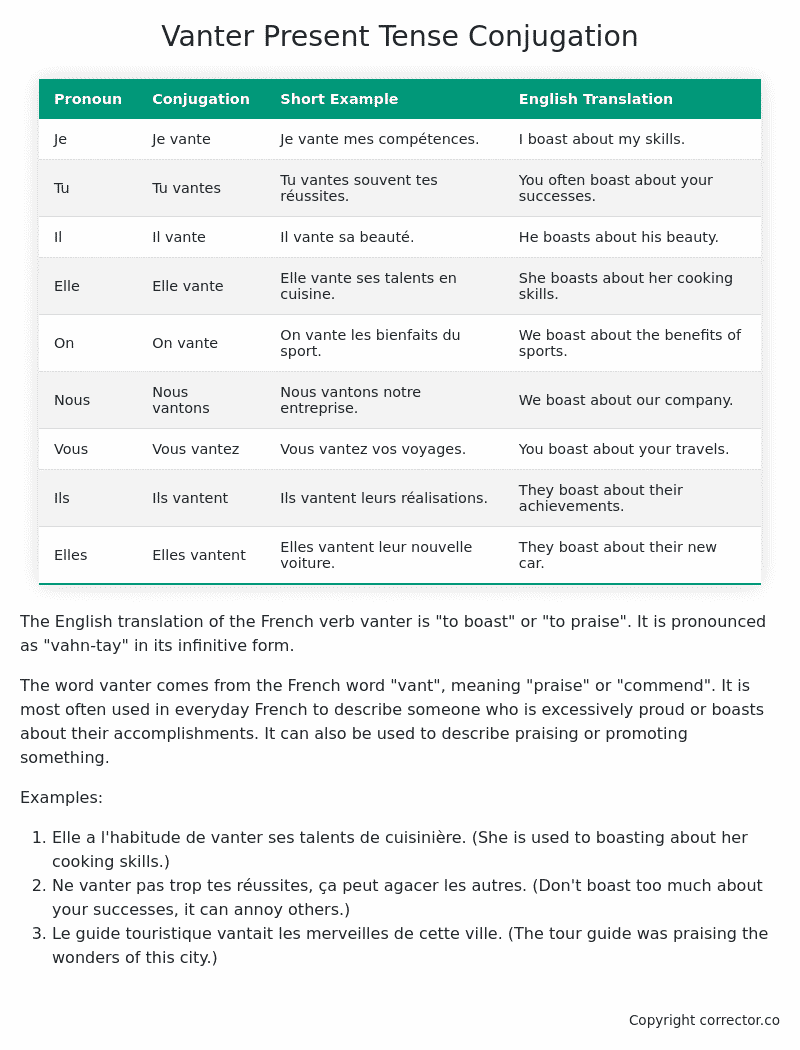Le Present (Present Tense) Conjugation of the French Verb vanter
Introduction to the verb vanter
The English translation of the French verb vanter is “to boast” or “to praise”. It is pronounced as “vahn-tay” in its infinitive form.
The word vanter comes from the French word “vant”, meaning “praise” or “commend”. It is most often used in everyday French to describe someone who is excessively proud or boasts about their accomplishments. It can also be used to describe praising or promoting something.
Examples:
- Elle a l’habitude de vanter ses talents de cuisinière. (She is used to boasting about her cooking skills.)
- Ne vanter pas trop tes réussites, ça peut agacer les autres. (Don’t boast too much about your successes, it can annoy others.)
- Le guide touristique vantait les merveilles de cette ville. (The tour guide was praising the wonders of this city.)
Vanter – About the French Present Tense
To take a deep dive into all the French tenses then see our article on Mastering French Tense Conjugation.
Common Everyday Usage Patterns For Le Present
Interactions with Other Tenses
Table of the Present Tense Conjugation of vanter
| Pronoun | Conjugation | Short Example | English Translation |
|---|---|---|---|
| Je | Je vante | Je vante mes compétences. | I boast about my skills. |
| Tu | Tu vantes | Tu vantes souvent tes réussites. | You often boast about your successes. |
| Il | Il vante | Il vante sa beauté. | He boasts about his beauty. |
| Elle | Elle vante | Elle vante ses talents en cuisine. | She boasts about her cooking skills. |
| On | On vante | On vante les bienfaits du sport. | We boast about the benefits of sports. |
| Nous | Nous vantons | Nous vantons notre entreprise. | We boast about our company. |
| Vous | Vous vantez | Vous vantez vos voyages. | You boast about your travels. |
| Ils | Ils vantent | Ils vantent leurs réalisations. | They boast about their achievements. |
| Elles | Elles vantent | Elles vantent leur nouvelle voiture. | They boast about their new car. |
Other Conjugations for Vanter.
Le Present (Present Tense) Conjugation of the French Verb vanter (this article)
Imparfait (Imperfect) Tense Conjugation of the French Verb vanter
Passé Simple (Simple Past) Tense Conjugation of the French Verb vanter
Passé Composé (Present Perfect) Tense Conjugation of the French Verb vanter
Futur Simple (Simple Future) Tense Conjugation of the French Verb vanter
Futur Proche (Near Future) Tense Conjugation of the French Verb vanter
Plus-que-parfait (Pluperfect) Tense Conjugation of the French Verb vanter
Passé Antérieur (Past Anterior) Tense Conjugation of the French Verb vanter
Futur Antérieur (Future Anterior) Tense Conjugation of the French Verb vanter
Subjonctif Présent (Subjunctive Present) Tense Conjugation of the French Verb vanter
Subjonctif Passé (Subjunctive Past) Tense Conjugation of the French Verb vanter
Subjonctif Imparfait (Subjunctive Imperfect) Tense Conjugation of the French Verb vanter
Subjonctif Plus-que-parfait (Subjunctive Pluperfect) Tense Conjugation of the French Verb vanter
Conditionnel Présent (Conditional Present) Tense Conjugation of the French Verb vanter
Conditionnel Passé (Conditional Past) Tense Conjugation of the French Verb vanter
L’impératif Présent (Imperative Present) Tense Conjugation of the French Verb vanter
L’infinitif Présent (Infinitive Present) Tense Conjugation of the French Verb vanter
Struggling with French verbs or the language in general? Why not use our free French Grammar Checker – no registration required!
Get a FREE Download Study Sheet of this Conjugation 🔥
Simply right click the image below, click “save image” and get your free reference for the vanter Present Tense tense conjugation!

I hope you enjoyed this article on the verb vanter. Still in a learning mood? Check out another TOTALLY random French verb present conjugation!



